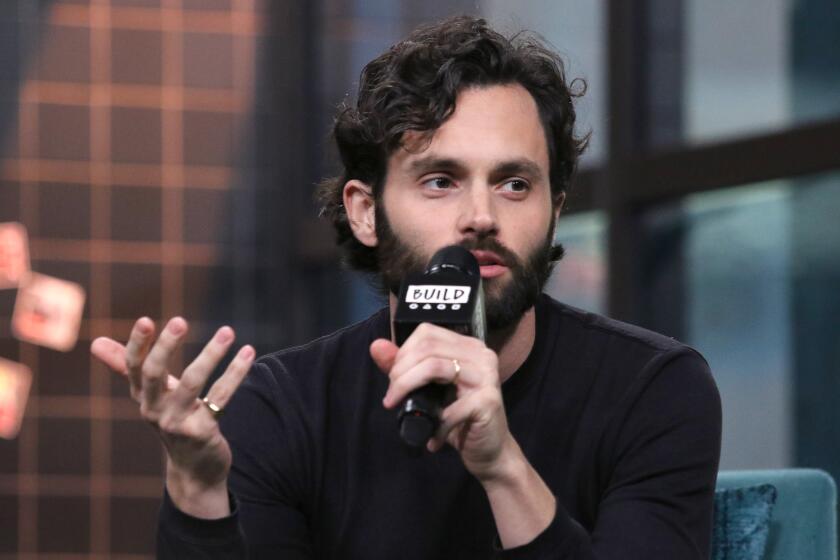‘You’ creator on Season 4 and having fewer sex scenes: ‘There’s no morality panic’
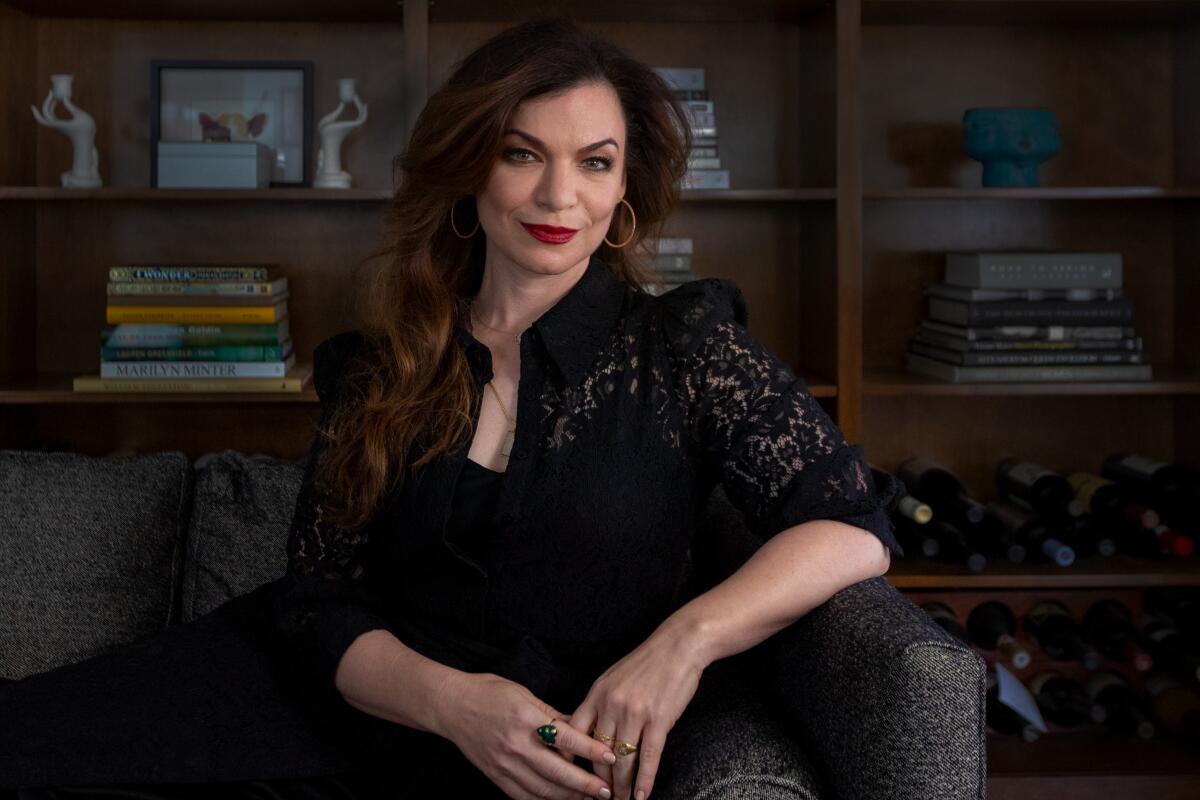
Warning: The following contains spoilers from “You” Season 4, Part 2.
Sera Gamble understands your Joe Goldberg conundrum. As the hopeless romantic and serial killer at the center of Netflix’s popular series “You,” Joe, played by Penn Badgley, is a thorny protagonist to follow: You love him! You’re weirded out by him! He’s toxic! Wait, you’re rooting for him to change?
“It feels like that in the [writers’] room, too,” says Gamble, the showrunner of the psychological thriller. “On any given morning, someone will be like, ‘We need to shove him off a building instead of some innocent victim this time.’ And then somebody else would be like, ‘Oh, I feel like he’s been really sweet to [love interest] Kate [Charlotte Ritchie] this season.’”
Joe has been wrestling with himself too.
After escaping death at the hands of his equally murderous wife, Love Quinn (Victoria Pedretti), Joe headed overseas. Season 4 — split into two installments, with Part 1 released last month — started off as a whodunit satirizing the British class system, with Joe posing as Jonathan Moore, an American literature professor in London drawn into the mystery of the Eat-the-Rich Killer. As we learn in Part 2, now streaming, all is not as it appears: Joe himself, in the midst of a psychological break, is the culprit, and has his former obsession Marienne (Tati Gabrielle), thought safe from harm in Paris, locked in a glass cage.
Joe’s unraveling felt inevitable, Gamble says. “It’s wearing on him.
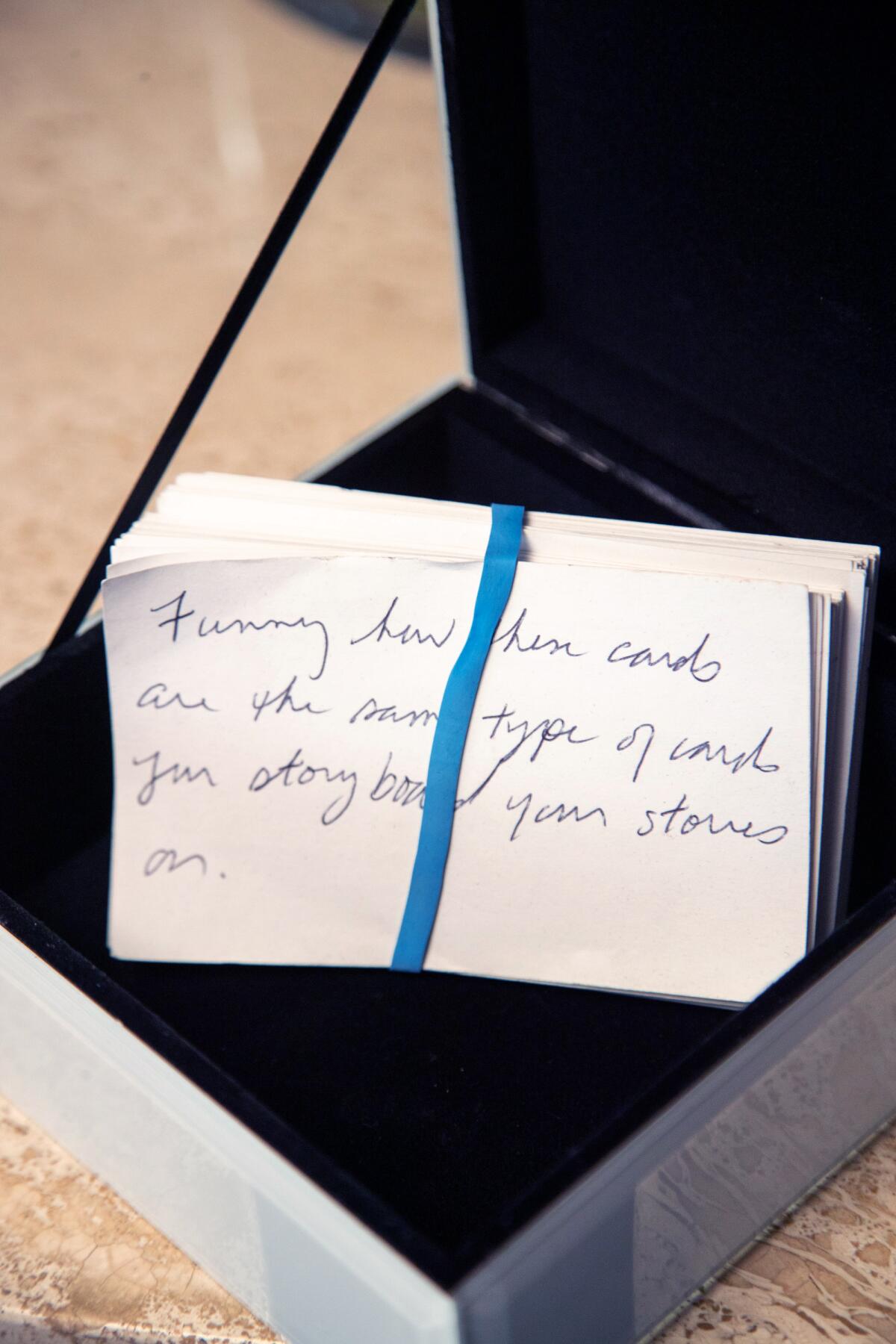
“Writers in the room all day, every day, talking about Joe — they have some pretty harsh judgments of him. And regularly, they’re like, ‘When are we going to punish this guy?’ Penn too. Penn is like: ‘How self-aware can you make him?’”
After going virtual during the critical stages of the pandemic, the writers room returned to working in person this season. “It was really hard to break most of a season on Zoom,” Gamble says. “You’re efficient because you have to be because the fatigue is quicker. But there really is so much about the chemistry of people in a room.”
She also acknowledges, with a tone of relief, that the pandemic forced her to change her relationship to work. After getting her professional start on ABC’s short-lived procedural “Eyes” in 2005, she joined the team at the CW’s “Supernatural,” leaving after its seventh season in 2012. In 2015, she created and executive produced SyFy’s “The Magicians,” which ran for five seasons, and in 2018 she developed “You,” based on Caroline Kepnes’ novels, with Greg Berlanti. She’s also currently an executive producer on Apple TV+’s “Physical,” starring Rose Byrne.
“I have worked pretty much nonstop for my adult life,” she says. “But the pandemic stepped up the level of working all the time with no breaks. The last couple of years has been a period of real introspection for me about how to just live my life in a more sustainable way and have a relationship to my work that is a little bit gentler and that can last for a really long time.”
In a recent video call from her home in Los Angeles, Gamble talked about the season’s shocking twists, “You’s” homage to Taylor Swift, and accommodating Badgley’s request for fewer sex scenes. The following conversation has been condensed and edited for clarity.
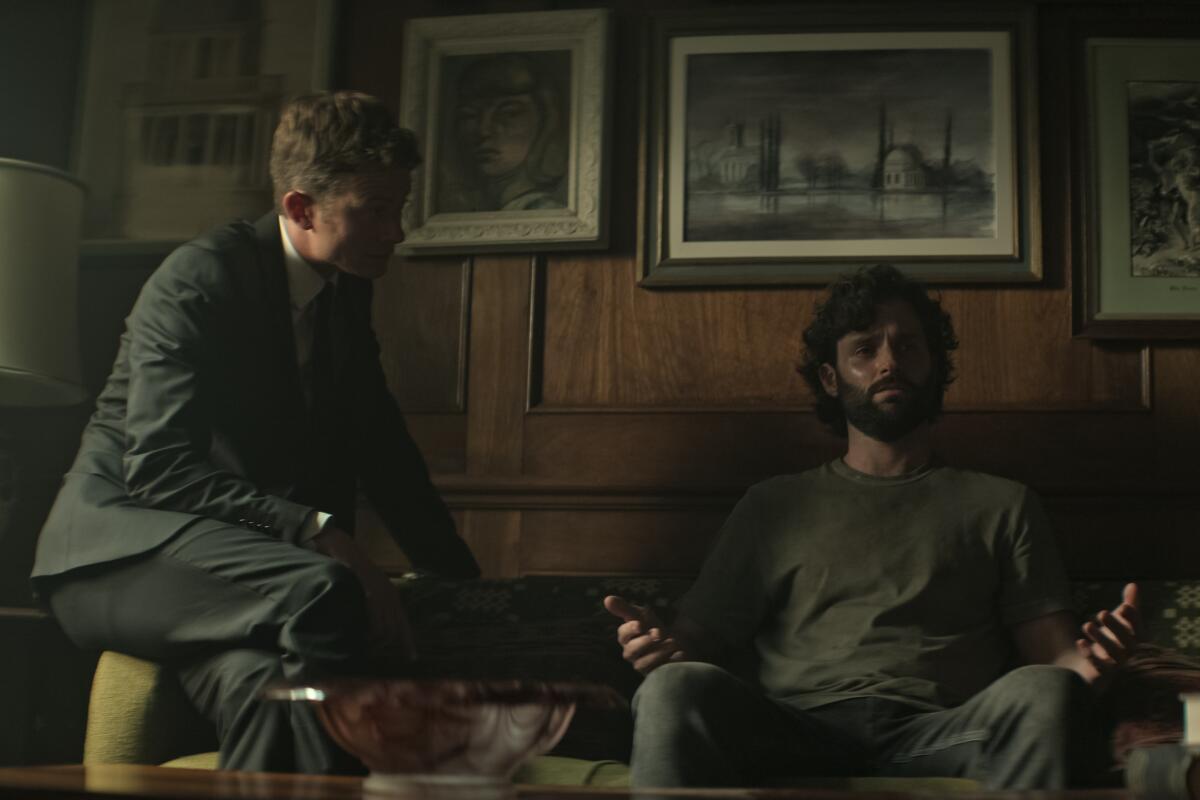
Hollywood’s most influential showrunners talk with The Times about how they broke into the business, the shifting TV landscape, their writing process and more.
‘We’re gonna go for it’
As Joe adjusts to his new life in London, there’s one person in his posh new circle of friends that he’s drawn to: Rhys Montrose (Ed Speleers). Rhys rose to prominence by writing a memoir about his troubled upbringing, which Joe found relatable.
In the Part 1 finale, Rhys is revealed to be the Eat-the-Rich Killer and the man who’s been stalking Joe and trying to frame him for murder. Except he isn’t really: He’s a symptom of Joe’s disassociation from reality.
We started from a place of, “What kind of man would Joe admire?” The key that unlocked the story for us was when we realized that Rhys was definitely a real person. We went back and forth as we were starting, to say, “How are we going to tell the story of the killer inside Joe has split off entirely?” We realized that we could have this be a public figure and then we started talking about how there are these horrible examples of people who have stalked and harmed public figures.
On a technical level, it was complicated. Because we’re doing a whodunit, we have to track through to make sure it made sense that Rhys could have and would have done all of the things. Then we had to track through and make sure Joe could have done all those things. And then we had another pass-through to do with Rhys, of course, because Rhys and Joe are the same person. In the writers room, we regularly broke our brains because it’s very easy to get overwhelmed with that many layers.
We as a room all had to hold hands and say, “OK, we’re going to go for one of these story reveals that’s really iconic and notoriously hard to do well, but we’re gonna do it. We’re gonna go for it. And we’re gonna do the thing where the guy is imaginary. Because we know there’s a really good reason that this is happening.” What is the point of doing a fourth season of a show like “You” if you don’t take a huge swing?
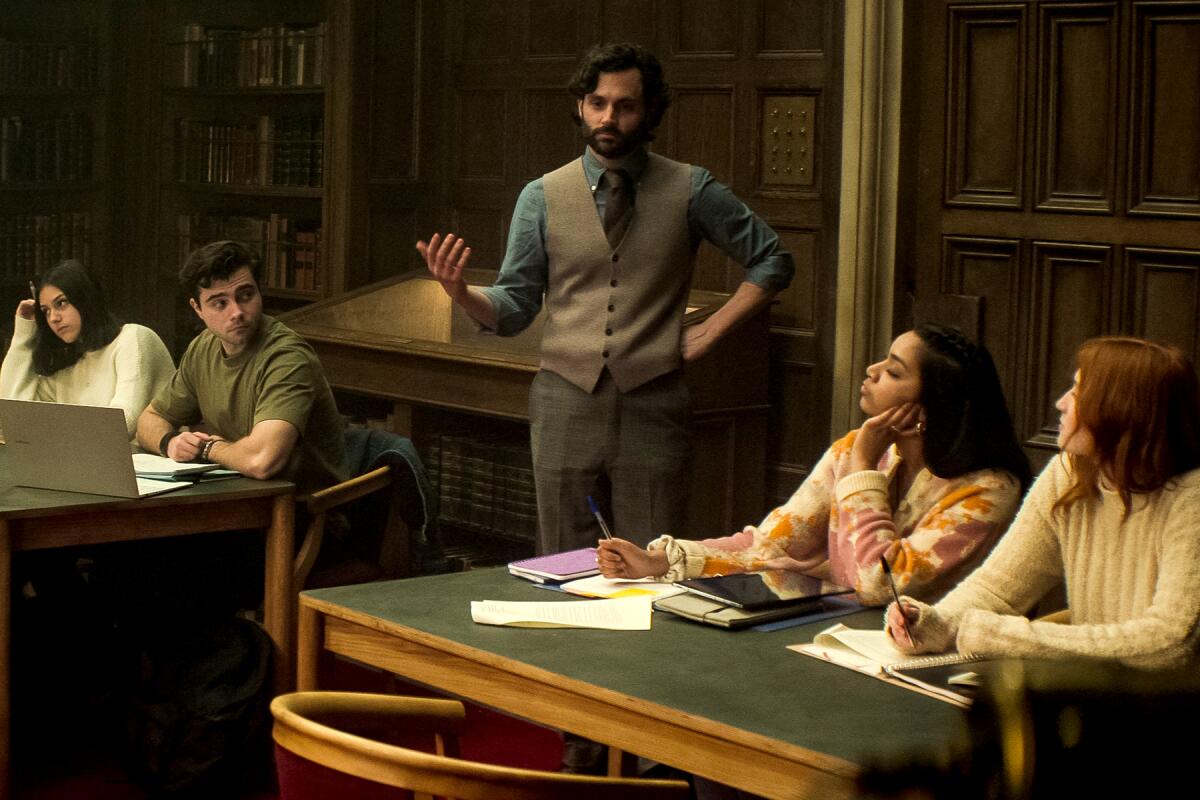
‘We were going to walk him all the way up to self-awareness’
In the season’s final episode, Joe finds clarity about himself for the first time. Realizing he can never really be reformed if he hurts and ultimately kills the women he purports to love, Joe decides his only way out of the cycle is to kill himself. After arguing with his alter ego, he mounts a bridge and jumps.
Gamble says the writers knew early on that Joe would attempt to take his own life. But Gamble has previously stated that Joe’s death is not necessarily the end game she has in mind because it’d be too easy — so, in the end, Joe survives the plunge.
The metaphor for the season that we kept coming back to was the idea of him standing on a bridge and that we were going to walk him all the way up to self-awareness, where he was for the first time. It’s not about admitting that you’re a murderer or a killer. It’s specifically about what he has done to the women that he loves. And that he has never spoken to before.
As to the series’ eventual ending, Gamble points to both the series’ cheeky and tragic aspects as potential inspiration.
If there were elements of it that felt like a fairy-tale happy ending, it would be at least as cheeky as a lot of the other stuff we’ve done. His story is tragic in that there are many points along the way where, if he made another choice, he wouldn’t go further down that road, which is sort of the classic structure of a tragedy. The kind of stuff that in TV, for about the last 15 or 20 years, we’ve been calling the single lead antihero story, where you’re watching an arc of a guy who appeals to you and is understandable to you and sometimes he’s quite heroic, but he also does progressively worse things until he’s driven to — I have to be generic about it — just something bad. [Joe] still believes in love in this deep way, and he still wants to live in a rom-com. That’s why he’s still Joe, even if he isn’t lying to himself about why he’s showing up at somebody’s house in the middle of the night. It’s both his reason for being and also his Achilles’ heel, that he lives for love.
Penn Badgley, star of Netflix’s ‘You,’ asked for fewer sex scenes in Season 4 out of concern for his marriage. He also doesn’t want to be typecast.
‘Sex on TV shows is usually not that sexy’
Badgley recently sparked headlines and debate with comments he made on his podcast, “Podcrushed,” about his aversion to filming intimate sex scenes. He revealed that he shared his feelings with Gamble ahead of the season, which prompted a reduction in the number of sex scenes.
“I asked Sera Gamble, the creator, ‘Can I just do no more intimacy scenes?’ Badgley said. “This is actually a decision I had made before I took the show. I don’t think I had ever mentioned it publicly, but one of the main things is like, do I want to put myself back in a career path where I’m just always a romantic lead?” he said, adding: “Fidelity, in every relationship, and especially my marriage [to Domino Kirke], is important to me. And it just got to that point where I don’t want to do that.”
While Badgley said he understood that total elimination would be inauthentic to the show, Gamble was receptive to his request and reduced the number of intimate scenes in the season.
I think that the reaction has gone far beyond what Penn said, which is comparatively simple. Intimacy is sensitive. If it weren’t a sensitive thing, then the position of intimacy coordinator wouldn’t exist, the same way that we’re not going to ask you to jump out an airplane — stunt coordinators should do it, right? I think that if an intimacy coordinator is in that conversation, they probably wouldn’t care what reason he may have had. It’s perfectly fine to share. I appreciate it when people disclose something personal to them. His body is his body. And we don’t make television shows that don’t respect that. That’s just not what we do.
Penn reiterated to me that he was not asking to change the content of the story. In fact, he has never demanded I change a single line of the show and he immediately acknowledged that there would be no way to write a season with nothing sexual happening to Joe. I think throwing sex scenes just to have sex in a show is kind of misguided because sex for its own sake — I mean, there is unlimited porn on the internet. And sex on TV shows is usually not that sexy. It has to be in service to the story.
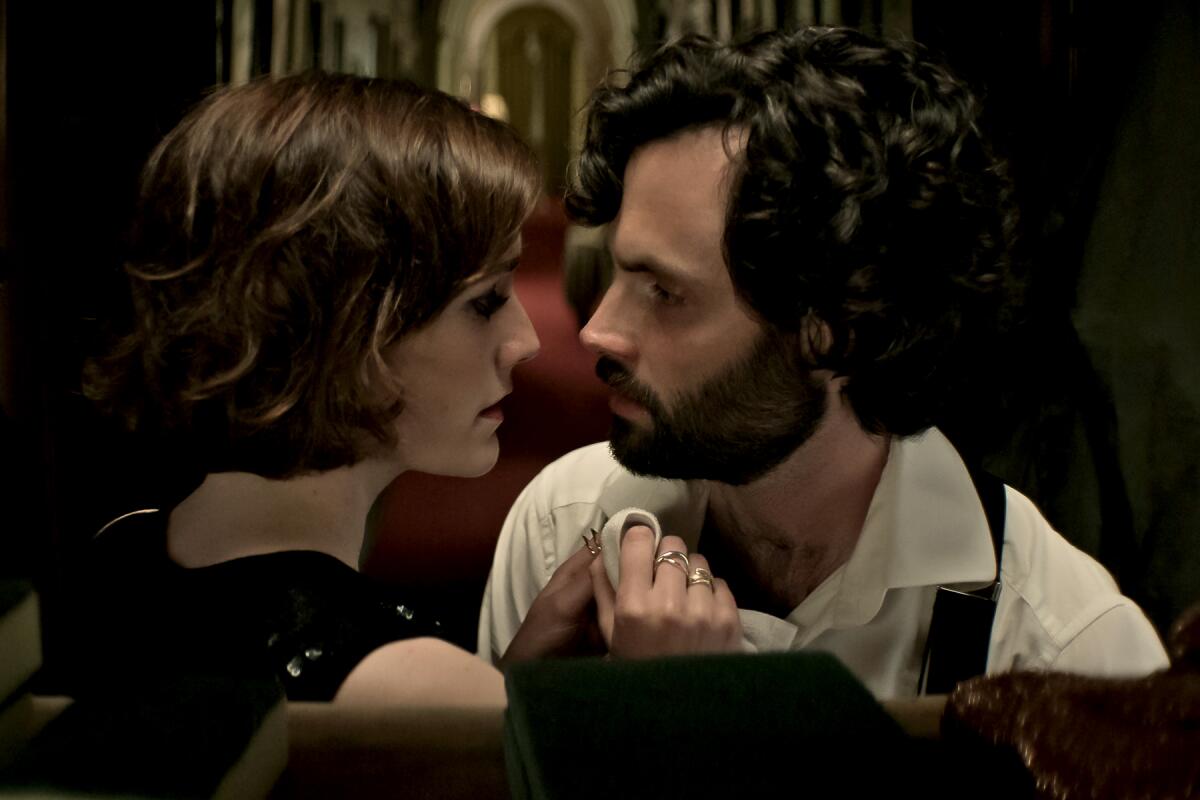
As to how the request will shape future seasons, Gamble says it’s an “ongoing, open conversation.”
What’s funny is we had to reshoot one of the sex scenes. The one in Episode 3, we needed to make a couple of changes to the story. So I called him and I said, “Great news, there’s an intimacy scene that you shot for Episode 3, we have to shoot it again in a different location because we didn’t really nail it the first time.” We both laughed.
For him, it is about what actions are being asked of him and being portrayed by his body. There are many ways to get around that, although, to my recollection, that’s all his performance in all of those scenes. We didn’t have to [use a body double]. But it was my responsibility and my job to make sure to talk to him early. He’s also a producer on the show. So it’s like, “Producer to producer, here’s what we’re going to do with No. 1 on the call sheet. I’m going to tell you as soon as I am aware that there is a scene that may have intimacy, and the intimacy coordinator, the director, you and I are all going to look at it early. And if there is something we need to talk about, that you have any concern about, let’s get to it.” There’s no morality panic around this with our show. Our show is still our show.
Intimacy coordinators are pretty standard now, but it’s only been for the last few years. I marvel at the difference from earlier in my career where there was such a low level of awareness. It sort of went without saying that people would do what was in the script and something might change on the day. A trained intimacy coordinator actually creates a system where you’re more likely to rehearse. Maybe I’m straying too far into this topic, and I should shut up and not feed this beast, but I feel like there have been these somewhat spurious arguments about spontaneity. But my observation is that just the discovery of moments happens when actors have a chance to play through the scene, which is what rehearsal affords them.
‘An homage to Taylor’
Is Joe Goldberg a Swiftie?
Viewers will recall that the final scene in Joe Goldberg and Love Quinn’s love story ended with Taylor Swift’s “Exile.” The current season features another apt song selection from Swift’s discography: “Anti-Hero.”
Shortly after the release of the song and music video last fall, Badgley went viral in his first TikTok video, in which he gave his spin to the “Midnights” single. The video shows Badgley running through an apartment to open the door to his fictional alter-ego Joe, who’s donning his signature stalker apparel — dark clothes and a baseball cap — while playfully mouthing the lyrics: “It’s me / Hi / I’m the problem. It’s me.” Swift seemed to enjoy the homage, commenting “OMG!!!!” along with a starstruck emoji.
We had this one last big song at the end and we were trying other music and it was one of those moments where my first thought was, “There’s no way they’ll give it to us. This song is too new.” And then my second thought was, “Well, you have to try.” I wrote a personal letter, actually, asking. Because at this point, the show — I would call the show “You” an homage to Taylor in a way, but that would be rude because it’s a show about killing women. I mean, have there ever been more perfect lyrics?
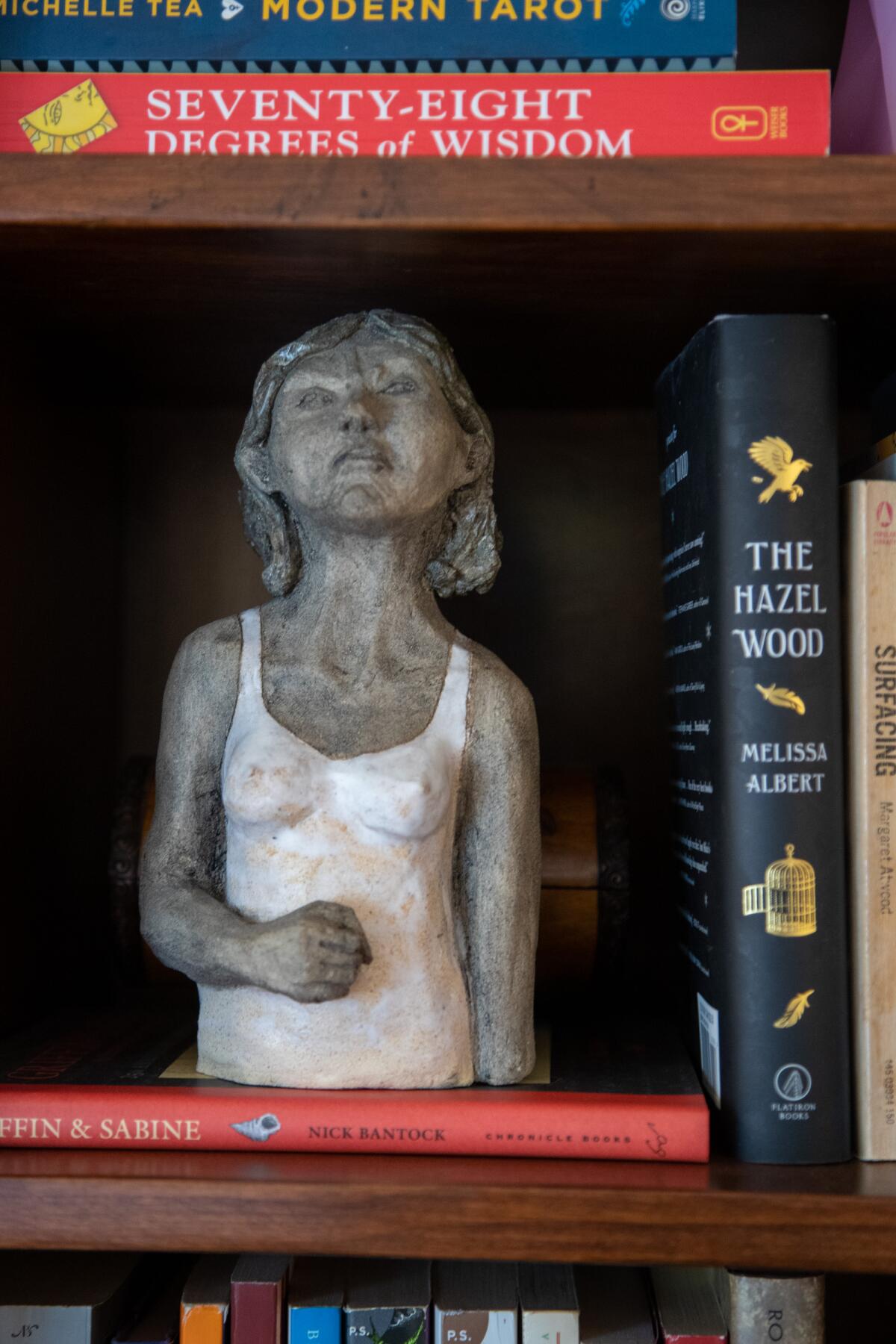
‘A real big refresh’
As we near the 15th year anniversary of the end of the last Hollywood writers’ strike, the threat of another looms. Studios and producers have been preparing for a possible strike over writers’ compensation in the age of streaming, with top concerns revolving around residuals from streaming, span protection due to shortened seasons, and the rise of mini rooms. Gamble, who was a midlevel writer on “Supernatural” during the last strike, is bracing for what’s ahead.
I don’t presume to know the outcome of this. But I do feel that this is serious; that there are a lot of issues and that writers at every level — very new writers and very seasoned writers and creators — have felt the impact of what’s been happening for the last couple of years. I can only really speak from my position as a showrunner. What I’ve experienced are writers who are sometimes tied to shows that don’t offer enough episodes, enough script fees or even a big enough chunk of the year for that to be their only job. And so scheduling has become a lot more complicated for them. At the same time, the general type of contract that we have is reflective of a previous era, where we were making more TV in less time. When I was on “Supernatural” it made sense that I had signed a contract that said I wouldn’t go work for another show, because they would lose me, right? You only had three months off a year, and then we’re making another season — if that. Now I want writers to get another job while they have a break, I want them to be paid according to their experience. If they’re producers, I want them to be paid for that. Because when you’re in a writers room — the job of a mini room where you’re breaking a season, and you’re doing that initial creative work, it’s impossible to overstate how informed that is by your practical experience as a producer. If these are the roads we’re going down, we have to address things like exclusivity, how people are paid, the definition of a mini room. All of this stuff just needs a real big refresh.
And while there’s been no official announcement that “You” will be renewed for a fifth season, Gamble is used to pivoting.
Want to know something funny? We opened the writers room for Season 3 in February 2020. There was a negotiation in May 2020, as well, and there was concern then that there might be a strike; that was a very serious conversation. We were actively talking about different scenarios with our benevolent overlords. And then March happened [the pandemic hit], and everyone was just like, “Or maybe I’ll never shoot it, right?” That’s reflected in in the contract, which made sense for everyone at the time. But in 2007, I remember my boss walking into my office and saying, “So this episode you’re writing, it might be the series finale.” It was like Episode 12 or something [of ‘Supernatural’]. And I was like, “Does this mean I can have more zombies?” That’s all I cared about. “We should make it bigger, right?”
More to Read
The complete guide to home viewing
Get Screen Gab for everything about the TV shows and streaming movies everyone’s talking about.
You may occasionally receive promotional content from the Los Angeles Times.
